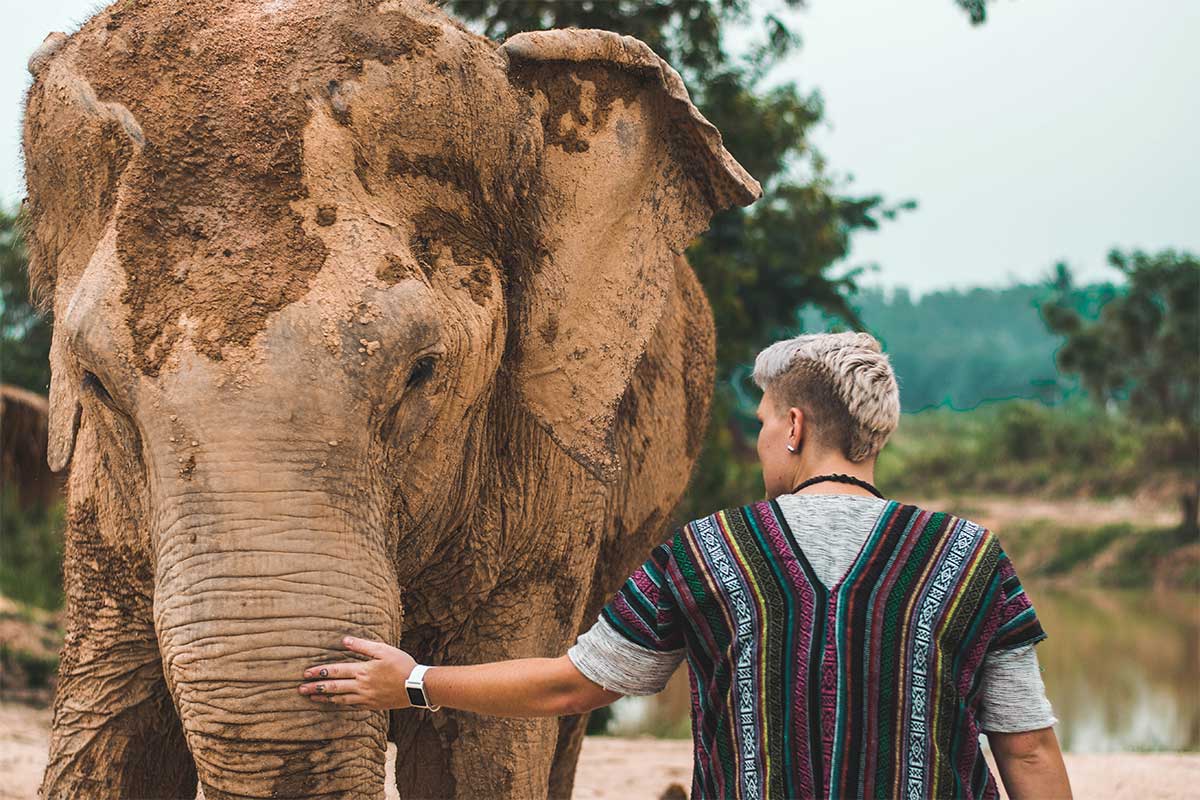Vedere gli elefanti in Thailandia proteggendoli è possibile!
Pubblicato il 17 dicembre 2024
La Thailandia è uno dei pochi paesi che ospitano ancora elefanti asiatici. Se la popolazione di elefanti africani, in pericolo, è stimata a 400.000 individui, quella del suo cugino asiatico è di soli 50.000. La specie ha conosciuto un enorme calo all'inizio del XX secolo con l'arrivo del modernismo in Asia. In Thailandia, ad esempio, si contavano circa 100.000 individui nel 1900, per arrivare a soli 13.000 cinquant'anni dopo. Oggi, ci sono solo 4.000 elefanti in Thailandia, di cui la metà allo stato selvatico.
Questi numeri sono impressionanti e ci portano a chiederci quale sia la causa di questa considerevole diminuzione. Durante un viaggio in Thailandia, sono molti i turisti che desiderano vivere un'esperienza con gli elefanti. È quindi importante scegliere bene il proprio sito.
La protezione degli elefanti, una questione di tutti
Bisogna risalire all'origine della domesticazione dell'elefante, che inizia più di 5.000 anni fa. Il legame che unisce l'uomo all'elefante non è recente. La forza e l'intelligenza di questo animale gli hanno valso una rapida domesticazione da parte dell'uomo, che lo utilizzava in vari modi: lavori agricoli, trasporto su terreni difficili, risorsa militare, e persino nel mondo della religione durante le cerimonie. L'indispensabilità dell'animale nella vita quotidiana dell'uomo giovava alla specie. Inoltre, l'impatto dell'uomo sulla natura era molto limitato, gli animali potevano prosperare in vasti spazi selvaggi.
Cosa ha quindi causato l'incredibile calo del numero di individui in un secolo?
Da una parte, la riduzione dello spazio dell'habitat naturale della specie, con la massiccia deforestazione e l'utilizzo da parte dell'uomo di questi spazi. Per quanto riguarda il legame tra uomo e animale, le macchine e l'industrializzazione hanno rapidamente sostituito il lavoro dell'elefante. Anche in ambito militare, i carri armati hanno rapidamente sostituito ciò che era una risorsa indispensabile per la vittoria. In breve, l'animale è quasi diventato un fastidio per l'uomo.
E quindi, cosa c'entra con te?
Dopotutto, se il numero di elefanti è diminuito, non è colpa tua. È semplice: con il turismo, l'uomo ha scoperto una nuova utilità per i pachidermi, trasformati in attrazione per viaggiatori in cerca di esotismo.
Le derive delle fattorie di elefanti in Thailandia
Visitare la Thailandia, o altri paesi del Sud-Est asiatico, è spesso l'occasione per fare delle passeggiate a dorso di elefante e assistere ad altri spettacoli dove, ad esempio, l'animale dipinge su una tela o gioca a calcio.
Ma non credere che lo faccia per piacere, perché gli piace o per amore del suo padrone. Se l'animale obbedisce, è perché c'è tutto un lavoro di sottomissione che consiste nel spezzare l'elefante fin dalla giovane età. Questo è ciò che viene chiamato phajaan.
Tieniti forte, ecco in cosa consiste:
Come incontrare gli elefanti in Thailandia senza nuocere loro?
In quanto consumatore, hai il potere di non finanziare questo commercio. Perché salendo a dorso di elefanti maltrattati, pagando per vedere spettacoli, sei complice di queste pratiche disumane.
Partire per la Thailandia significa quindi scegliere bene le proprie attività con consapevolezza.

In reazione a questi metodi violenti e crudeli, una voce si è alzata 30 anni fa, quella della thailandese Sangduen. Da bambina, ha assistito al phajaan. Il piccolo elefante torturato soffriva così tanto che urlava, e lei chiese al mahout di fermarsi. Lui le rispose: «No, non ha tempo di riposare, si riposerà quando morirà.»
Da allora, decise che un giorno avrebbe creato un centro di salvataggio e protezione per questi animali. Ci riuscì nel 1996 con l'aiuto di Green Tours. Così nacque l'Elephant Nature Park a Chiang Mai. Il santuario accoglie elefanti maltrattati e vittime del turismo di massa. Vivono in un ambiente il più naturale possibile, vicino a quello che avrebbero allo stato selvatico. Traumatizzati dai trattamenti delle loro precedenti vite da schiavi, la stragrande maggioranza ha perso la voglia di vivere.
Il santuario cura gli elefanti e li aiuta a riprendersi mentalmente, là dove le ferite sono più profonde. Questo primo santuario fu un esempio per il paese e anche per i paesi che hanno elefanti asiatici. I centri di salvataggio sono quindi apparsi un po' ovunque.
Durante un viaggio in Thailandia, chiedi all'agenzia locale Odasie, che condivide questa visione di rispetto degli animali e del paese, di portarti a scoprire gli elefanti. Manda i suoi viaggiatori esclusivamente in santuari rinomati: l'Elephant Nature Park di Chiang Mai in primo luogo, nel cuore di una natura lussureggiante, ma anche l'Elephant Haven di Kanchanaburi così come il Pang Nga Elephant Park nel cuore della regione di Phang Nga, nel sud della Thailandia.
Ci sarebbe ancora molto da dire sull'argomento, ma non faremo una tesi su questo tema, tanto duro quanto appassionante. È un argomento che ci sta particolarmente a cuore e di cui volevamo parlarvi. Quindi, durante il vostro tour in Thailandia, non cadete nella trappola del turismo di massa e della "animal attraction". Non pensate di non poter fare nulla di fronte a questa situazione, perché rappresentate la 'lobby' positiva del consumo. Avete il potere di cambiare le cose sostenendo le cause giuste e fondamentalmente umaniste.
Un sito di
Personalizza i tuoi viaggi con Quotatrip e ricevi offerte su misura direttamente nella tua casella di posta.